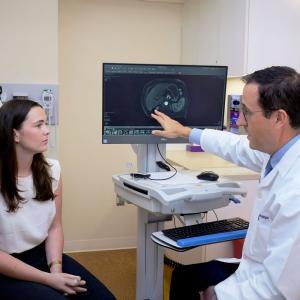
Dr. Ira M. Jacobson and nurse practitioner Mary C. Olson
Photo: Karsten Moran
Two physician–scientists joined NYU Langone Health in 2017 to lead programs to enhance care for patients with liver disease. Internationally renowned Ira M. Jacobson, MD, joined the Division of Gastroenterology as director of hepatology, and Theodore H. Welling, MD, joined NYU Langone to lead Perlmutter Cancer Center’s new Liver Tumor Program. Dr. Jacobson and Dr. Welling also work closely with the NYU Langone Transplant Institute, which offers state-of-the-art surgical care for patients with end-stage liver disease.
A Pioneer in the Treatment of Liver Disease
Dr. Jacobson is a highly distinguished clinician and researcher widely respected for his groundbreaking research in developing antiviral therapy for hepatitis. He has been involved in more than 100 clinical trials testing novel, direct-acting antiviral drugs. He was also lead investigator for the national WIN-R trial, which established the role of weight-based ribavirin dosing in the treatment of hepatitis C infection in African Americans.
Dr. Jacobson, who previously served as chair of the Department of Medicine at Mount Sinai Beth Israel in New York City, will maintain an active hepatology, gastroenterology, and endoscopy practice at NYU Langone.
“Dr. Jacobson’s work has helped transform hepatitis C infection from a chronic disease to one that can be cured, benefiting countless individuals across the globe.”
—Mark B. Pochapin, MD
“Dr. Jacobson’s work has helped transform hepatitis C infection from a chronic disease to one that can be cured, benefiting countless individuals across the globe,” says Mark B. Pochapin, MD, the Sholtz/Leeds Professor of Gastroenterology, director of the Division of Gastroenterology and Hepatology, and vice chair of clinical affairs in the Department of Medicine. “He greatly enhances our ability to treat patients, strengthens our understanding of liver disease through research, and broadens our education of the next generation of physicians.”
New Multidisciplinary Liver Tumor Program Targets Liver Cancer
Cancers affecting the liver and the bile ducts are the target of the new Liver Tumor Program at NYU Langone’s Perlmutter Cancer Center. The program is designed to provide multidisciplinary clinical care and to rapidly translate research breakthroughs into treatments at the center. The program brings together many specialists—hepatologists, oncologists, surgeons, interventional radiologists, radiation oncologists, researchers, nurses, and others—with the shared goal of implementing a comprehensive, evidence-based approach to researching and treating liver and biliary cancers. This team also works closely with the NYU Langone Transplant Institute to provide patients the option of a liver transplant when appropriate.
Nationally recognized for his advances in liver transplantation, laparoscopic liver surgery, and surgery requiring expertise in bile-duct and hepatic-vascular resection and reconstruction, NYU Langone recruited surgeon and researcher Theodore H. Welling, MD, associate professor of surgery, to Perlmutter Cancer Center to lead the new program. Dr. Welling joined NYU Langone in July 2017 after serving as co-director of the multidisciplinary liver tumor program at the University of Michigan Health System.
“A disease this complex needs to be approached from all angles to provide the best possible patient care,” says Dr. Welling. “The Liver Tumor Program at Perlmutter Cancer Center offers patients a highly personalized and efficient treatment model—each patient has a team of experts behind them to address their particular needs.” At NYU Langone, Ira M. Jacobson, MD, will collaborate closely with Dr. Welling on the Liver Tumor Program as the medical center’s new director of hepatology.
Left Lobe Grafts Decrease Donor Risk for Living Donor Liver Transplants
NYU Langone’s Transplant Institute features state-of-the-art diagnosis and advanced treatment for patients with end-stage liver disease. With the worldwide shortage of deceased donor organs, NYU Langone experts are also at the forefront of improving outcomes and reducing risks associated with living donor transplants.
Enthusiasm for living donor liver transplants declined following adoption of the Model for End-Stage Liver Disease (MELD) organ allocation system in the United States, as well as heightened concern for donor safety, Nabil N. Dagher, MD, associate professor of surgery, director of abdominal transplant surgery, and director of the Transplant Surgery Fellowship at NYU Langone, notes in an article published in the April 2017 issue of International Anesthesiology Clinics. He goes on to cite evidence suggesting that living donor liver transplant should be reconsidered for select patients.
At NYU Langone and other highly specialized centers, there has been a trend toward using smaller left lobe grafts, which is less risky for donors but which, Dr. Dagher notes in his article, has traditionally raised concerns about small-for-size syndrome. Dr. Dagher then points to evidence suggesting that left lobe procedures can lead to good outcomes for both donors and recipients when performed in experienced centers and using careful selection criteria. “Having clear policies and protocols in place is essential,” says Dr. Dagher. “Left lobe grafts can be a better option in some cases, based on certain criteria, including patient MELD score and the graft-to-recipient weight ratio.”

